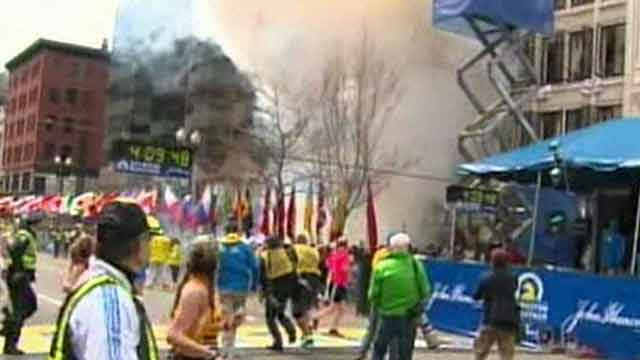Obama defends handling of Boston terror attack
How did Tamerlan Tsarnaev slip through the cracks if everyone did their jobs?
WASHINGTON – President Barack Obama said Tuesday his counterterrorism bureaucracy "did what it was supposed to be doing" before the Boston Marathon bombing as his top intelligence official began a review into whether sensitive information was adequately shared and whether the U.S. government could have disrupted the attack.
"We want to go back and we want to review every step that was taken," Obama told a White House news conference. "We want to leave no stone unturned. We want to see, is there in fact additional protocols and procedures that could be put in place that would further improve and enhance our ability to detect a potential attack."
The 90-day review is also a political pre-emptive strike as Republican lawmakers question whether the administration's law enforcement and intelligence agencies failed to share crucial counterterrorism information — the same error blamed for missing the clues before the terrorist attacks of Sept. 11, 2001. Some Republican lawmakers have already suggested forming a select committee to investigate the Boston bombings, just as they are calling for a similar committee to delve further into the militant attacks that killed four Americans last year in Benghazi, Libya.
Shawn Turner, a spokesman for Director of National Intelligence James Clapper, said the review covers the period before the Boston attack because the investigation of the bombings is still underway. Initiated earlier this week, it's being carried out by I. Charles McCullough III, the independent intelligence community inspector general. He is authorized to reach into any U.S. intelligence agency.
The question centers on whether the FBI, CIA and Homeland Security Department shared enough with each other about Tamerlan Tsarnaev, a suspect in the Boston Marathon bombings who died in an escape attempt. The Russian government had tipped off the FBI and the CIA about his possible links to militancy. His brother, Dzokhar, also a suspect, is in custody.
The intelligence community review does not preclude any other reviews by Congress.
Bradley Schreiber, a Homeland Security senior adviser during the Bush administration and a veteran of such reviews, said the 90-day review DNI has started may not provide enough answers.
"The only way you are going to get a thorough review ... is to have an independent panel review the circumstances," Schreiber said. "You need a third party, presidential commission that has clear lines of authority to cross jurisdictional boundaries."
Turner said that Clapper believes the review will show his agencies shared information about the suspect appropriately, a sentiment echoed by Obama.
"Based on what I've seen so far, the FBI performed its duties, the Department of Homeland Security did what it was supposed to be doing," Obama said, describing how the FBI interviewed the elder Tsarnaev.
Obama called it "hard stuff" to stop terror attacks, especially ones by what he described as "self-radicalized individuals" who choose to kill and maim "because of whatever warped, twisted ideas they may have."
Tamerlan Tsarnaev first came to the attention of U.S. officials in early 2011, when Russia told the FBI that Tamerlan and his mother were religious extremists. The FBI investigated them, and the Tsarnaevs' names were added to a Homeland Security Department database used to help screen people entering and leaving the U.S. But the FBI found nothing linking them to religious extremists or terrorists, and asked the Russians twice for more information to help with the investigation. The FBI never heard back and closed its investigation in June 2011.
In the fall of that year, the Russians reached out to the CIA with the same concerns. The CIA shared this with the FBI, and also asked that the names of Tamerlan and his mother, Zubeidat Tsarnaeva, be entered into a massive government database of people with suspected terrorist ties. The FBI again reached out to Russia for more information, and never heard back.
When Tamerlan Tsarnaev traveled to and from Russia in 2012, his travel did not raise alarms because the FBI had closed its investigation into Tsarnaev a year earlier.
Members of Congress may not be satisfied with any Obama administration review.
Rep. Peter King, R-N.Y., a member of the House intelligence committee, told CNN that the FBI also came across information on the suspect on its own, "which it did not think was significant enough to follow up on or they thought there was not enough substance to it to go further. ... OK, twice, but three times? To me it warranted at least the FBI going further, keeping the file open."
Rep. Adam Schiff, D-Calif., also a member of the House intelligence committee, said: "Just because the FBI didn't find derogatory information about the suspects doesn't mean it wasn't there to be found. But nor should we leap to a conclusion of malfeasance. Instead, this review may produce one important component of the 'lessons learned' from the attacks."
___
Associated Press writers Eileen Sullivan and Alicia A. Caldwell in Washington contributed to this report.
Follow Dozier on Twitter at http://twitter.com/kimberlydozier and http://bigstory.ap.org/tags/kimberly-dozier










































